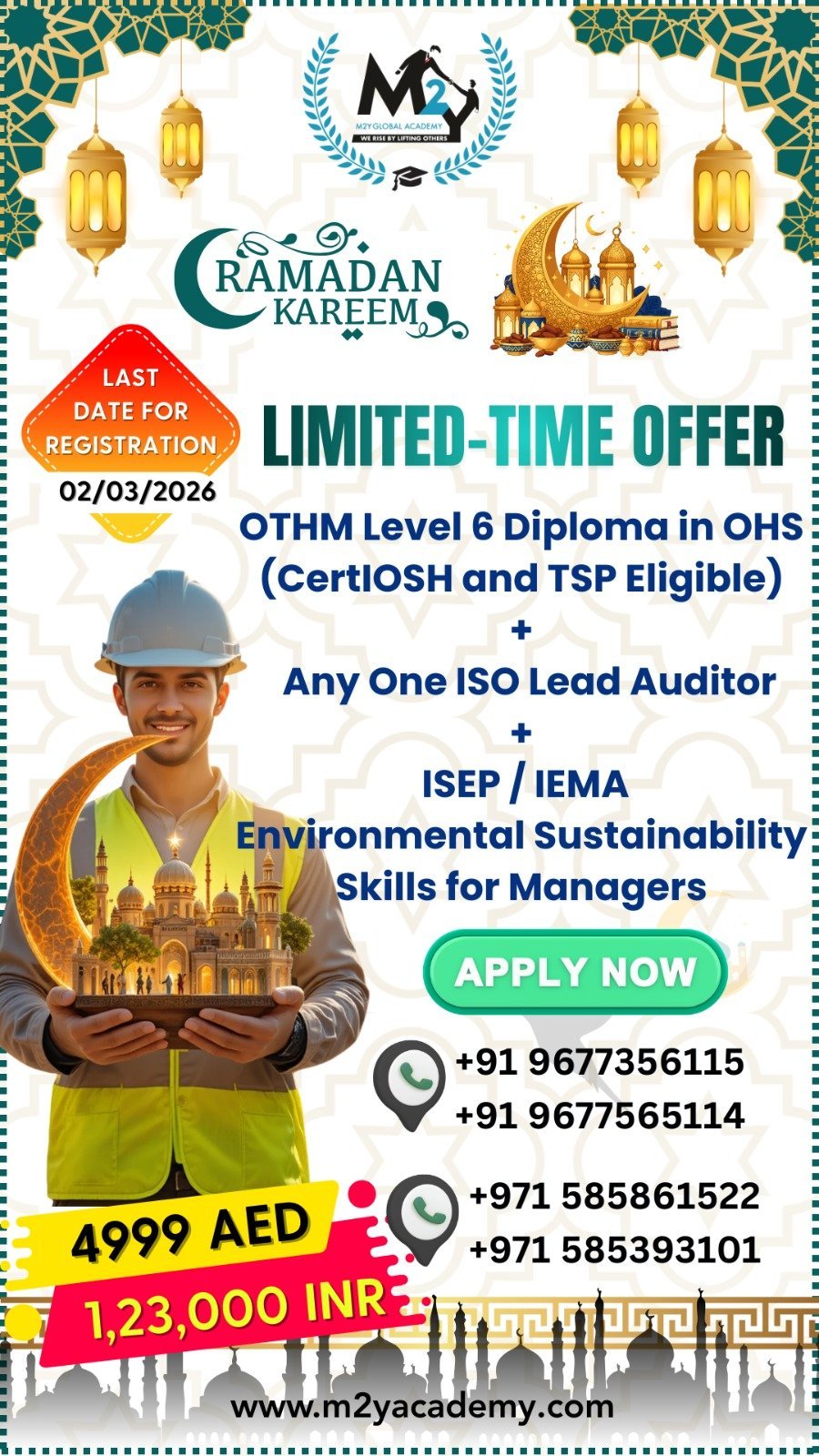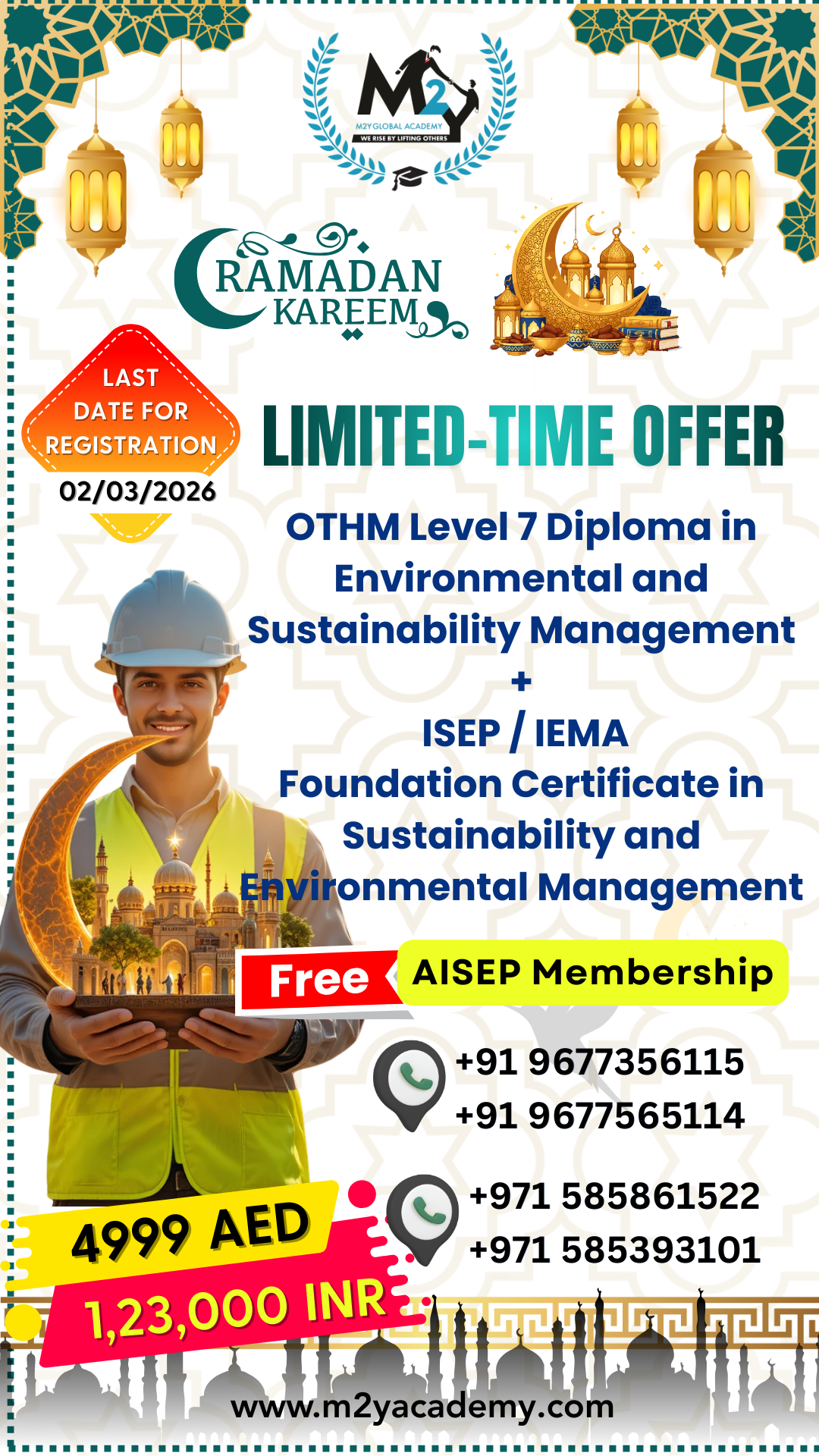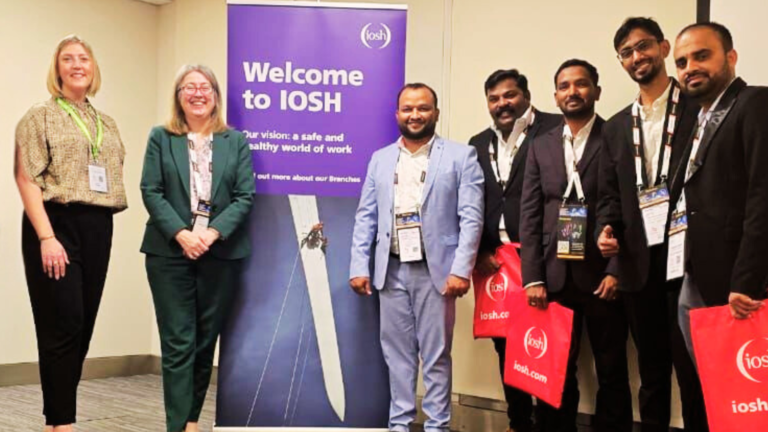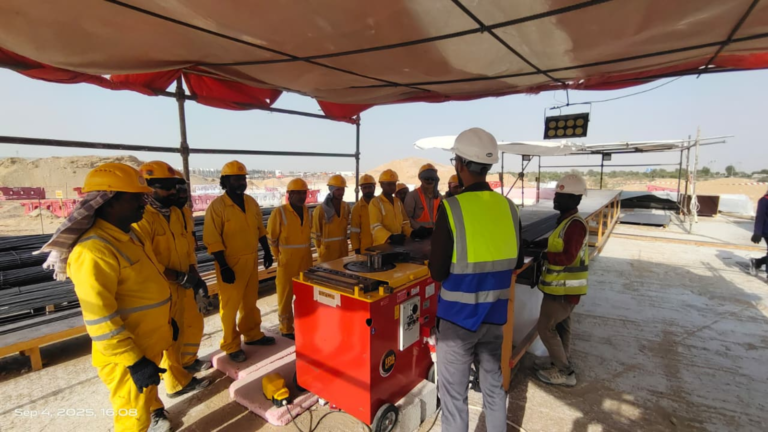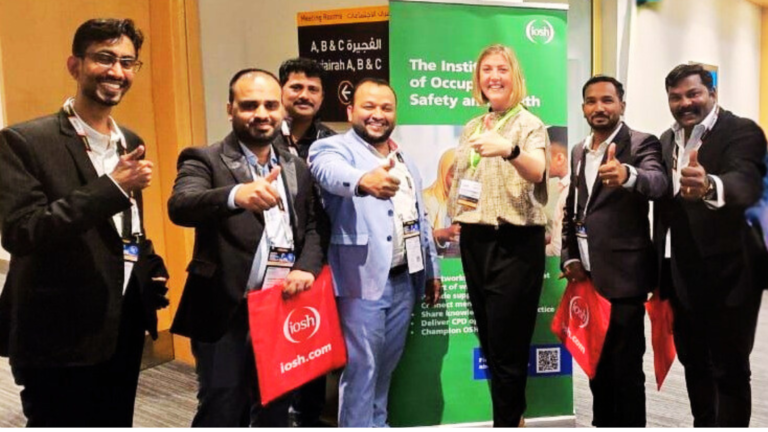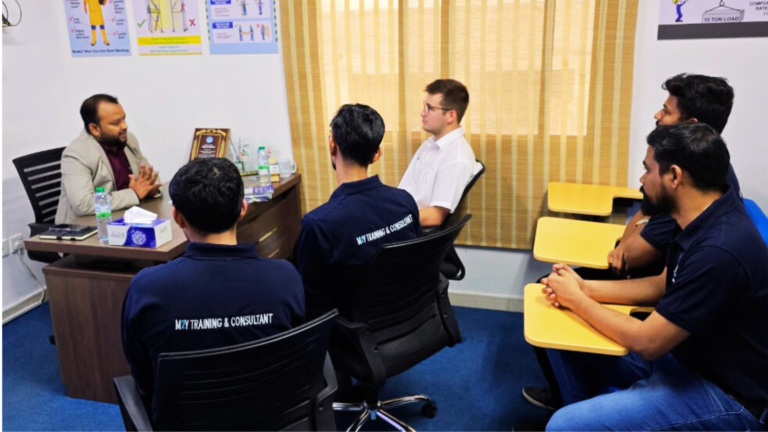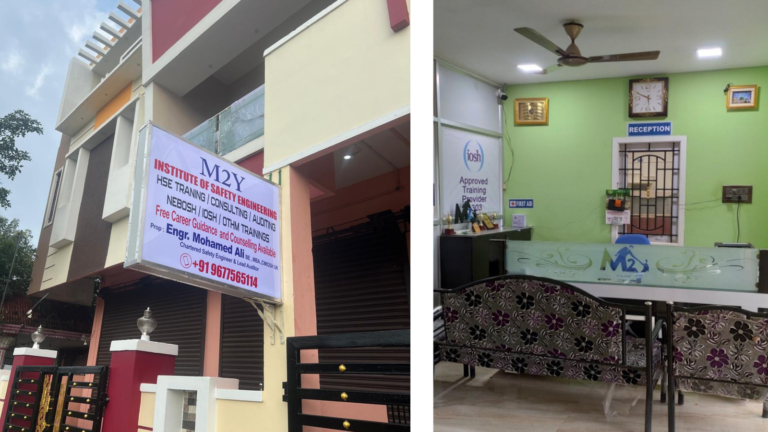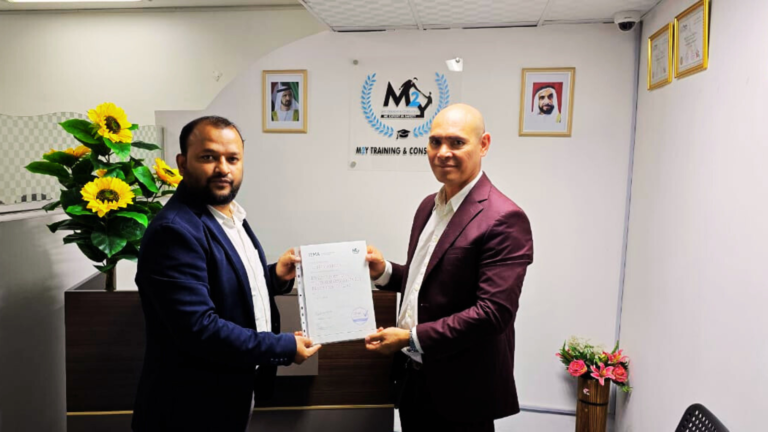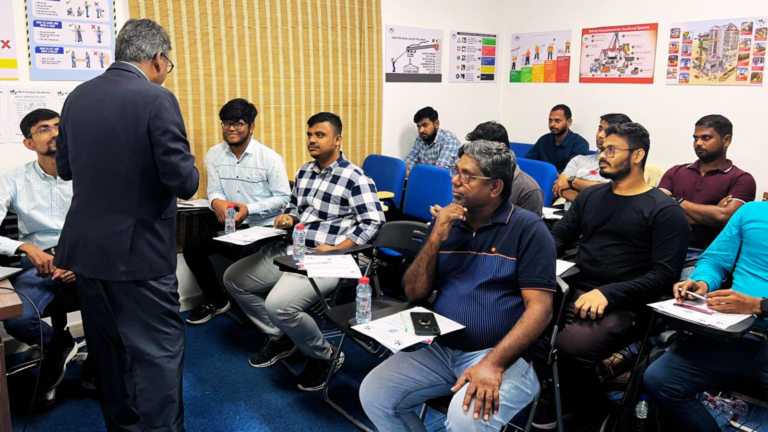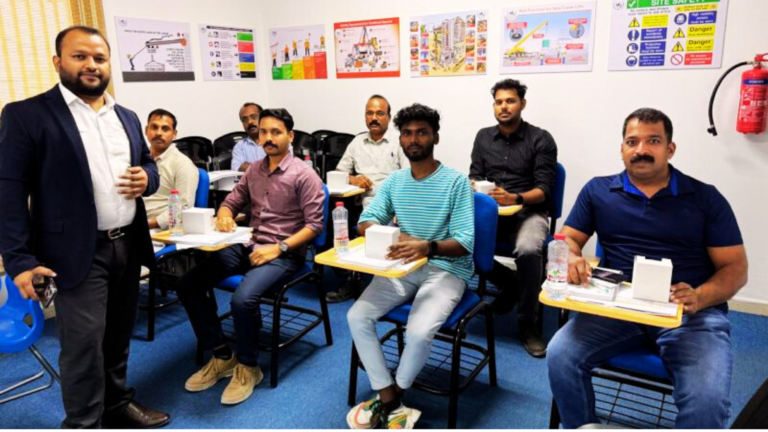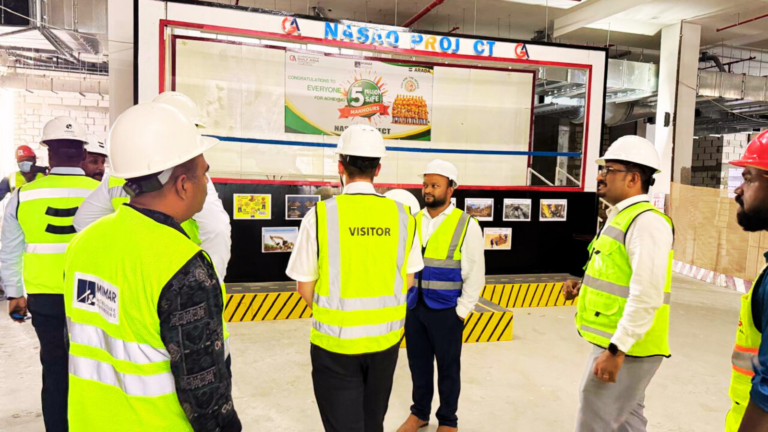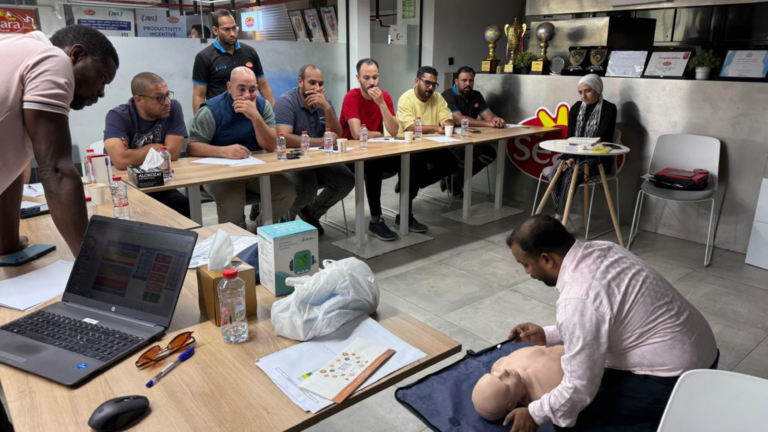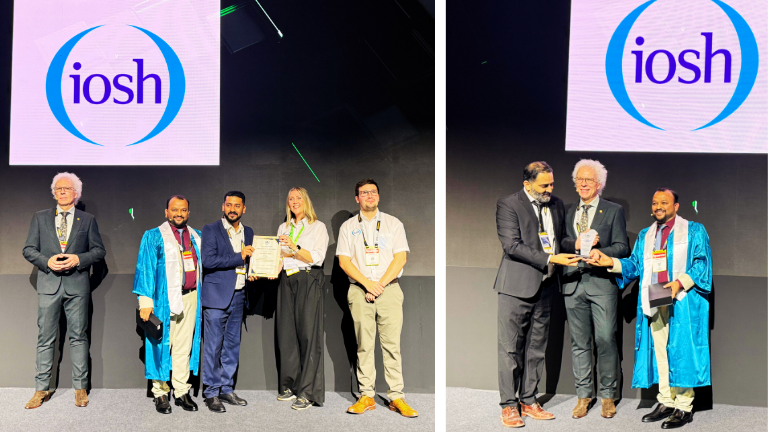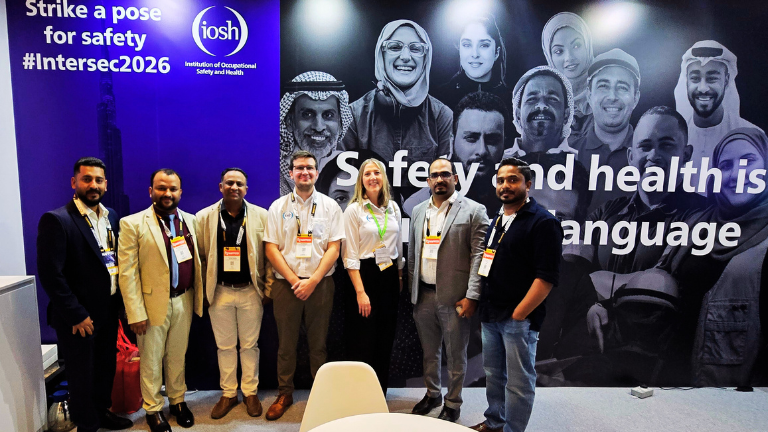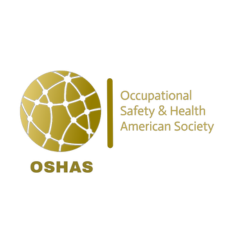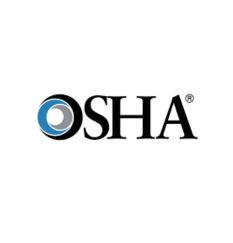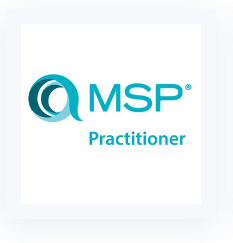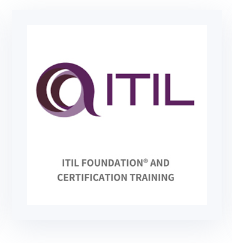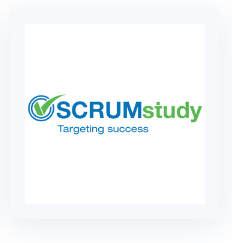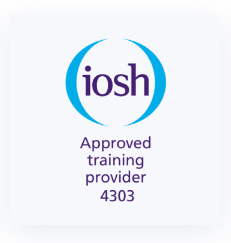Food Safety Training
Why Food Safety Training Is Non-Negotiable in UAE's Thriving Hospitality Industry
It’s Friday evening at a popular Dubai restaurant. Families fill every table. The kitchen bustles with activity. Then, 48 hours later, 15 customers are hospitalized with severe food poisoning. The restaurant’s reputation—built over years—collapses overnight. Legal action follows. The business never fully recovers.
This nightmare scenario happens more often than the industry admits.
According to the World Health Organization, unsafe food causes 600 million cases of foodborne illness annually, resulting in 420,000 deaths worldwide. In the UAE, with its massive hospitality sector serving millions of residents and tourists, food safety isn’t just good practice—it’s a legal requirement and business necessity.
Here’s the reality: Every person handling food in the UAE—from five-star hotel chefs to street food vendors, from hospital cafeteria staff to catering company employees—must understand food safety principles. One contaminated ingredient, one improperly stored dish, one inadequately washed hand can trigger an outbreak affecting hundreds.
Whether you’re:
- A restaurant owner ensuring compliance
- A food handler seeking employment
- An aspiring chef building credentials
- A facilities manager overseeing cafeterias
- A catering business protecting your reputation
Food safety training is your foundation for success.
This comprehensive guide explains what food safety is, why training matters, certification requirements in UAE, career opportunities, and how to choose the right food safety course.
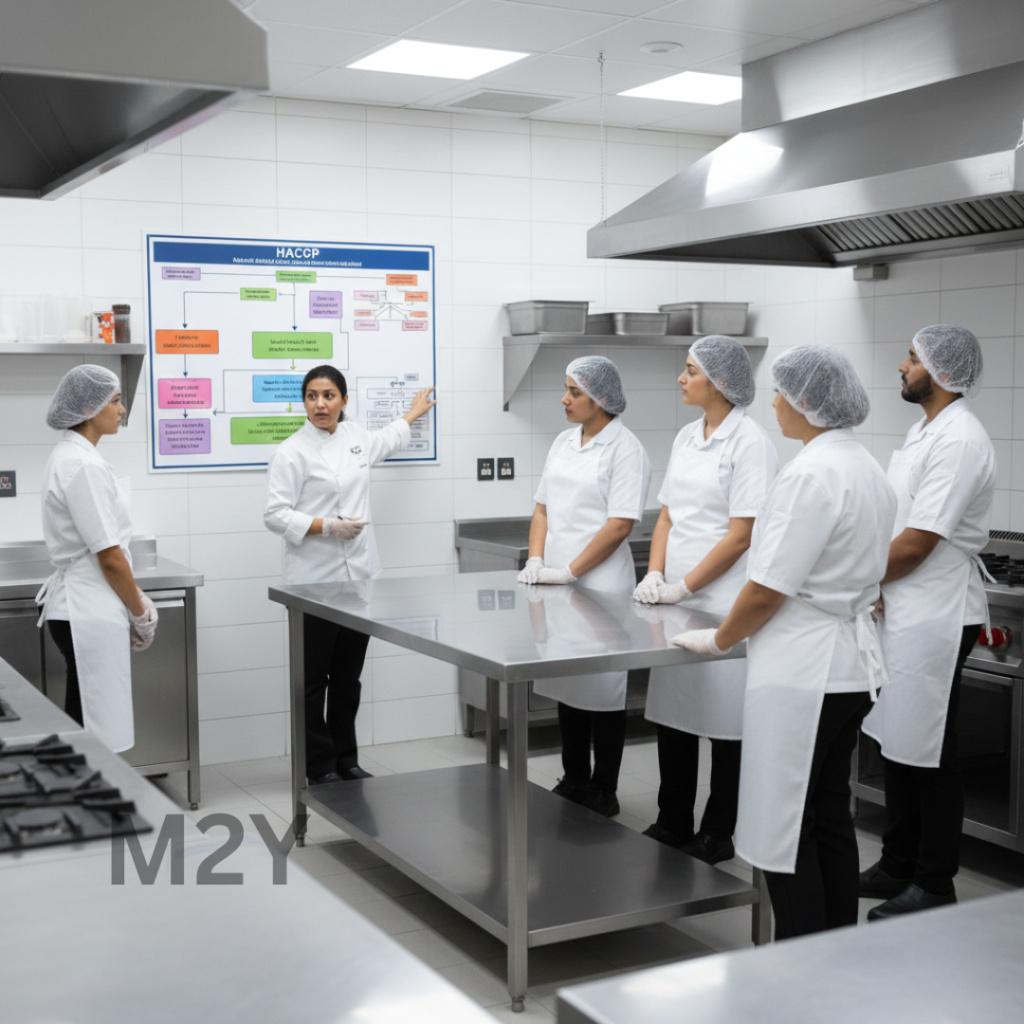
What Is Food Safety?
Food safety refers to the practices, procedures, and conditions required to prevent foodborne illness by ensuring food is handled, prepared, stored, and served in ways that prevent contamination and maintain quality.
Food safety encompasses:
Biological Hazards:
- Bacteria (Salmonella, E. coli, Listeria)
- Viruses (Norovirus, Hepatitis A)
- Parasites (Toxoplasma, Cryptosporidium)
- Fungi and molds
Chemical Hazards:
- Cleaning agents and sanitizers
- Pesticide residues
- Food additives and preservatives
- Allergens
Physical Hazards:
- Glass, metal, or plastic fragments
- Hair, jewelry, or personal items
- Packaging materials
- Bones or shells in processed foods
The goal: Eliminate, reduce, or control these hazards throughout the food chain from farm to fork.
Why Food Safety Matters in UAE
The UAE presents unique food safety challenges:
Extreme Climate: The UAE’s high temperatures (45°C+ in summer) accelerate bacterial growth, making proper refrigeration and temperature control absolutely critical. The “danger zone” (5°C-60°C) where bacteria multiply rapidly is easier to enter in UAE’s climate.
Diverse Supply Chain: UAE imports over 80% of its food from 200+ countries. Each origin presents different standards, requiring vigilant inspection and handling protocols.
Multicultural Workforce: Food handlers come from 200+ nationalities, each with different food safety awareness levels and training backgrounds. Standardized training ensures consistent practices.
High Tourism Volume: Dubai welcomed over 14 million tourists in 2023. Food safety incidents don’t just affect individuals—they damage UAE’s international reputation.
Dense Population: With high-density living and dining, foodborne illness can spread rapidly through communities, schools, and workplaces.
Legal Framework: UAE food safety regulations are strict, with severe penalties for violations including fines up to AED 100,000, business closure, and potential criminal charges.
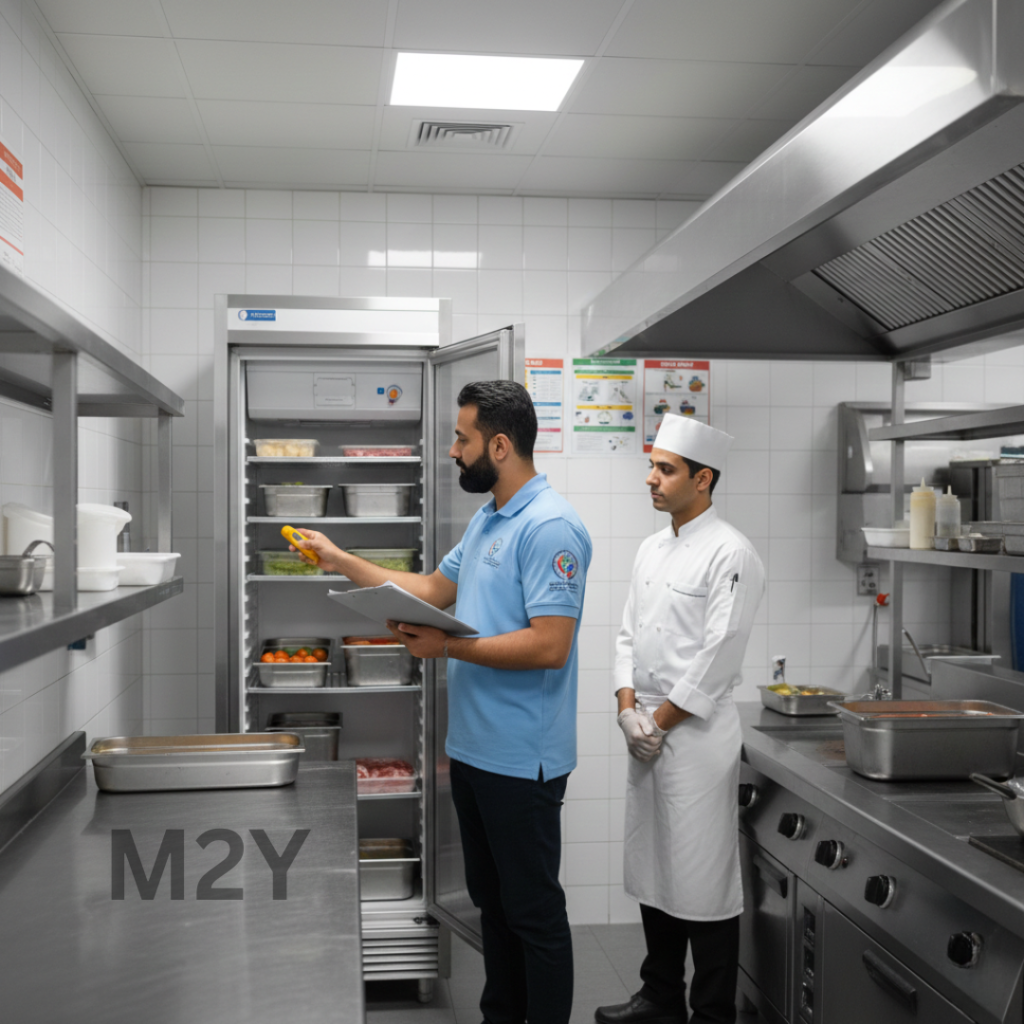
Understanding Food Safety: Key Principles
The Four Core Food Safety Principles
1. Clean (Personal and Environmental Hygiene)
Contamination often starts with poor hygiene practices:
Personal hygiene requirements:
- Handwashing: 20 seconds with soap, especially after restroom use, handling raw foods, touching hair/face, and between tasks
- Clean uniforms and aprons daily
- Hair restraints (nets, caps)
- No jewelry except plain wedding bands
- Fingernails short and clean, no nail polish
- Cover cuts and wounds with waterproof bandages
Environmental cleanliness:
- Regular cleaning schedules for all surfaces
- Sanitizing food contact surfaces between uses
- Proper waste disposal
- Pest control programs
- Clean equipment and utensils
2. Separate (Preventing Cross-Contamination)
Cross-contamination occurs when harmful bacteria transfer from one food to another:
Color-coded system:
- Red: Raw meat and poultry
- Blue: Raw fish and seafood
- Yellow: Cooked foods
- Green: Salads and fresh produce
- White: Dairy products
- Brown: Vegetables (root vegetables)
Separation practices:
- Dedicated cutting boards by food type
- Separate storage areas for raw and cooked foods
- Raw foods stored below cooked foods in refrigerators
- Different utensils for raw and ready-to-eat foods
- Physical barriers in preparation areas
3. Cook (Proper Temperature Control)
Cooking food to proper internal temperatures kills harmful bacteria:
Safe minimum internal temperatures:
- Poultry (chicken, turkey): 75°C (165°F)
- Ground meats: 71°C (160°F)
- Beef, pork, lamb (whole cuts): 63°C (145°F) with 3-minute rest
- Fish and seafood: 63°C (145°F)
- Eggs: 71°C (160°F) or until yolk is firm
- Leftovers and casseroles: 74°C (165°F)
Use food thermometers—visual assessment isn’t reliable.
4. Chill (Proper Storage and Temperature Maintenance)
Bacteria multiply rapidly at room temperature:
Temperature requirements:
- Refrigeration: Below 5°C (41°F)
- Freezing: -18°C (0°F) or below
- Hot holding: Above 60°C (140°F)
The 2-hour / 4-hour rule:
- Under 2 hours at room temperature: Food is safe, refrigerate immediately
- 2-4 hours: Food is safe to consume immediately but must not be refrigerated for later use
- Over 4 hours: Food must be discarded
Thawing safely:
- In refrigerator (safest, plan ahead)
- Under cold running water
- In microwave (cook immediately after)
- NEVER thaw at room temperature
HACCP: The Gold Standard for Food Safety
Hazard Analysis and Critical Control Points (HACCP) is a systematic preventive approach to food safety:
The 7 HACCP Principles:
1. Conduct Hazard Analysis
- Identify potential biological, chemical, and physical hazards
- Assess severity and likelihood
- Determine control measures
2. Identify Critical Control Points (CCPs)
- Points in the process where hazards can be controlled or eliminated
- Examples: cooking temperatures, cooling times, storage conditions
3. Establish Critical Limits
- Minimum or maximum values that must be met
- Examples: cooking to 75°C, cooling within 2 hours
4. Establish Monitoring Procedures
- How CCPs will be monitored
- Who will monitor
- Frequency of monitoring
- Documentation requirements
5. Establish Corrective Actions
- What to do when critical limits aren’t met
- Immediate actions to control hazards
- Prevent recurrence procedures
6. Establish Verification Procedures
- Confirm HACCP system is working
- Calibration of equipment
- Review of records
- Testing and sampling
7. Establish Record-Keeping and Documentation
- HACCP plan documentation
- Monitoring records
- Corrective action logs
- Verification records
Common Foodborne Illnesses
Understanding pathogens helps prevent outbreaks:
Salmonella:
- Sources: Raw poultry, eggs, meat, unwashed produce
- Symptoms: Diarrhea, fever, abdominal cramps (6-72 hours after exposure)
- Prevention: Proper cooking, avoiding cross-contamination
E. coli (Escherichia coli):
- Sources: Undercooked ground beef, raw milk, contaminated water
- Symptoms: Severe stomach cramps, bloody diarrhea, vomiting
- Prevention: Cook meat thoroughly, wash produce, pasteurized dairy only
Listeria (Listeria monocytogenes):
- Sources: Deli meats, unpasteurized dairy, soft cheeses, refrigerated smoked seafood
- Symptoms: Fever, muscle aches, confusion (can be severe for pregnant women)
- Prevention: Proper refrigeration, reheating deli meats, pasteurized products
Norovirus:
- Sources: Infected food handlers, contaminated surfaces, shellfish
- Symptoms: Nausea, vomiting, diarrhea, stomach pain (12-48 hours after exposure)
- Prevention: Hand hygiene, sick food handlers stay home, proper shellfish handling
Staphylococcus aureus:
- Sources: Food handlers with infected cuts, inadequately refrigerated foods
- Symptoms: Nausea, vomiting, stomach cramps (30 minutes to 6 hours)
- Prevention: Hand hygiene, covering wounds, time/temperature control
Food Safety Training Courses in UAE
Basic Food Handler Certification
Duration: 1 day (6-8 hours)
Ideal for: Kitchen staff, servers, baristas, deli workers, catering staff
Cost: AED 150 – AED 200
Certification validity: 2-3 years
This foundational course covers essential food safety knowledge required for anyone handling food in UAE establishments.
Curriculum includes:
Personal Hygiene:
- Proper handwashing techniques
- Personal cleanliness standards
- When to stay home from work (illness policy)
- Appropriate work attire
Food Safety Principles:
- Biological, chemical, and physical hazards
- Temperature control and monitoring
- Cross-contamination prevention
- Safe food storage practices
Cleaning and Sanitizing:
- Difference between cleaning and sanitizing
- Proper chemical use and dilution
- Cleaning schedules and procedures
- Equipment maintenance
Receiving and Storage:
- Inspecting deliveries
- First-in, first-out (FIFO) rotation
- Proper storage locations and temperatures
- Shelf life and date labeling
Allergen Awareness:
- Major food allergens (nuts, dairy, eggs, shellfish, etc.)
- Cross-contact prevention
- Ingredient disclosure to customers
- Emergency response to allergic reactions
Legal Requirements:
- UAE food safety regulations
- Dubai Municipality standards
- Consequences of violations
- Inspector expectations
Assessment:
- Written examination (multiple choice)
- Practical demonstration (may include handwashing, thermometer use)
- Certificate issued upon passing (typically 70-80% required)
M2Y Safety Consultancy delivers food handler training in English, Arabic, and Hindi to accommodate UAE’s diverse workforce, ensuring complete comprehension regardless of primary language.
HACCP Training
Duration: 2-3 days
Ideal for: Kitchen managers, food safety officers, chefs, quality assurance staff
Cost: AED 800 – AED 1,200
Certification validity: 3-5 years
HACCP training prepares food professionals to implement and manage systematic food safety programs.
Curriculum includes:
HACCP Fundamentals:
- History and development of HACCP
- Benefits of HACCP implementation
- Prerequisite programs
- HACCP team formation
The 7 HACCP Principles (detailed):
- Comprehensive hazard analysis techniques
- CCP determination decision trees
- Critical limit establishment methodologies
- Monitoring system design
- Corrective action planning
- Verification and validation procedures
- Record-keeping systems
Practical Application:
- Creating HACCP plans for specific operations
- Flow diagram development
- CCP monitoring worksheets
- Documentation templates
- Case study analysis
Advanced Topics:
- Microbiological testing programs
- Supplier approval and verification
- Traceability and recall procedures
- Internal auditing techniques
- Continuous improvement strategies
Assessment:
- Written examination
- HACCP plan development project
- Practical scenario evaluation
Food Safety Management System (FSMS) Training
Duration: 3-5 days
Ideal for: Food business managers, quality managers, consultants
Cost: AED 1,500 – AED 2,500
Certification validity: 3-5 years
This advanced course covers comprehensive food safety management system implementation aligned with ISO 22000 standards.
Curriculum includes:
ISO 22000 Requirements:
- Management responsibility
- Resource management
- Safe product planning and realization
- Validation, verification, and improvement
- Documentation requirements
System Integration:
- Combining HACCP with ISO frameworks
- Quality management system alignment
- Operational prerequisite programs
- Hazard control plan development
Audit and Compliance:
- Internal audit procedures
- Supplier auditing
- Regulatory compliance verification
- Third-party certification preparation
Crisis Management:
- Product recall planning and execution
- Crisis communication protocols
- Incident investigation
- Corrective and preventive action systems
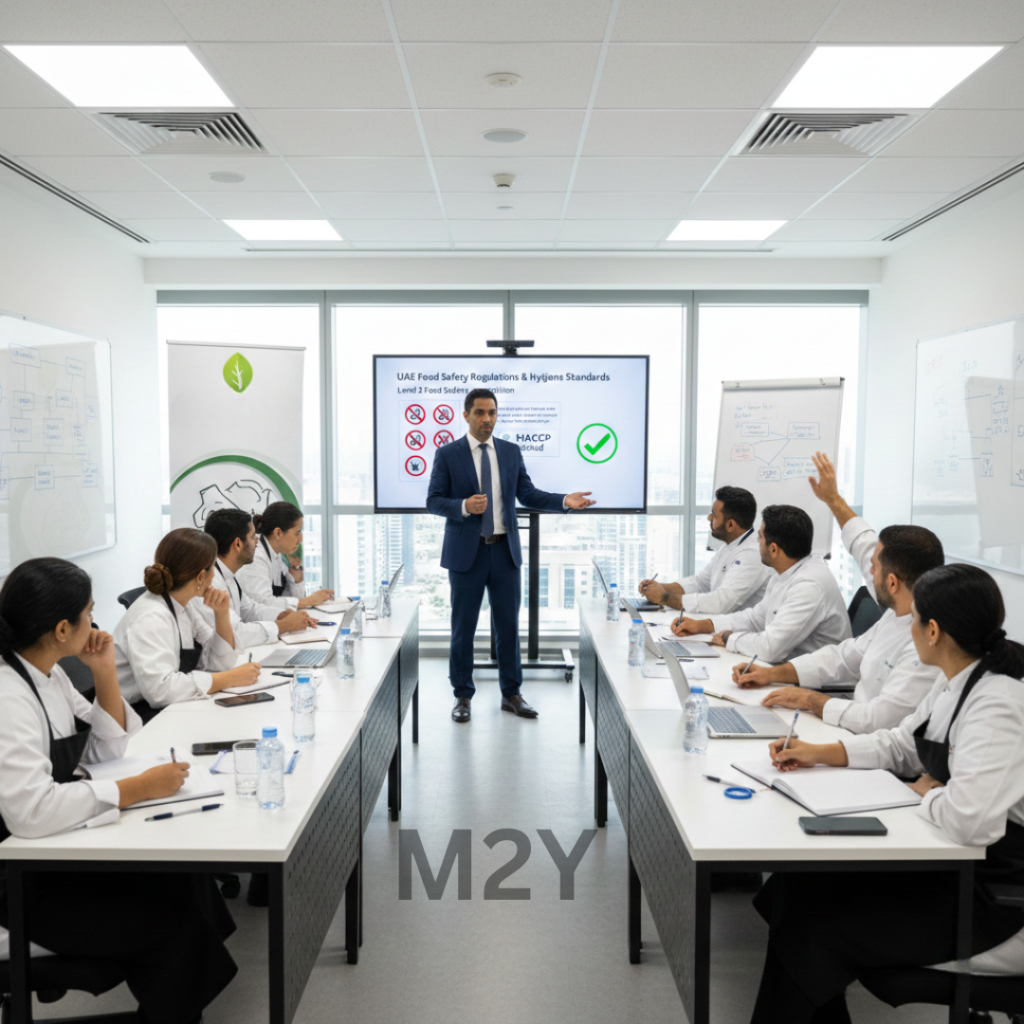
Specialized Food Safety Training
Allergen Awareness (Half-day, AED 100-150):
- Understanding food allergies vs. intolerances
- 14 major allergens in UAE regulations
- Menu labeling requirements
- Kitchen procedures to prevent cross-contact
- Customer communication
- Emergency response
Food Safety for Supervisors (2 days, AED 400-600):
- Advanced microbiology
- Regulatory compliance management
- Staff training techniques
- Inspection preparation
- Incident investigation
- Performance monitoring
Catering and Events Food Safety (1 day, AED 200-300):
- Off-site food preparation challenges
- Transportation temperature control
- Equipment setup and sanitation
- Buffet and self-service safety
- Outdoor event considerations
Food Safety Training Comparison Table
| Training Type | Duration | Investment (AED) | Validity | Target Audience | Certification Level |
|---|---|---|---|---|---|
| Basic Food Handler | 1 day | 150 – 200 | 2-3 years | All food handlers | Entry-level |
| HACCP Training | 2-3 days | 800 – 1,200 | 3-5 years | Supervisors, managers | Intermediate |
| FSMS (ISO 22000) | 3-5 days | 1,500 – 2,500 | 3-5 years | Quality managers | Advanced |
| Allergen Awareness | Half-day | 100 – 150 | 2 years | Food handlers, servers | Specialized |
| Supervisor Training | 2 days | 400 – 600 | 3 years | Kitchen supervisors | Intermediate |
| Refresher Course | 4-6 hours | 100 – 150 | Extends validity | Certified handlers | Maintenance |
Legal Requirements for Food Safety Training in UAE
Federal UAE Regulations
UAE Cabinet Resolution No. 5 of 2001 (Food Control) requires:
- All food handlers must have valid health certificates
- Food safety training mandatory for all food handling personnel
- Regular retraining (typically every 2-3 years)
- Training records maintained and available for inspection
- Foreign food handler certificates may require validation
Dubai Municipality Requirements
Dubai Municipality Food Safety Department mandates:
- Food handler certificate from approved training providers
- Medical fitness certificates updated annually
- Training must cover Dubai-specific regulations
- Renewal every 2-3 years
- Digital certificate verification system
Food establishment categories:
- High risk (restaurants, caterers): Enhanced training requirements
- Medium risk (cafeterias, bakeries): Standard training
- Low risk (packaged goods retailers): Basic awareness
Penalties for non-compliance:
- Operating without certified food handlers: AED 5,000 – AED 20,000
- Repeat violations: Temporary closure, license suspension
- Foodborne illness outbreaks: AED 50,000 – AED 100,000, potential criminal charges
Abu Dhabi Food Control Authority
Abu Dhabi Agriculture and Food Safety Authority (ADAFSA) requirements:
- ADAFSA-approved food safety training programs
- Integration with OSHAD safety management for larger operations
- Enhanced traceability requirements
- Digital inspection and compliance tracking
- Specific requirements for catering licenses
Free Zone Regulations
Dubai free zones (JAFZA, DMCC, etc.) may have specific requirements:
- Alignment with federal and emirate regulations
- Additional export/import safety protocols
- Documentation for international standards compliance
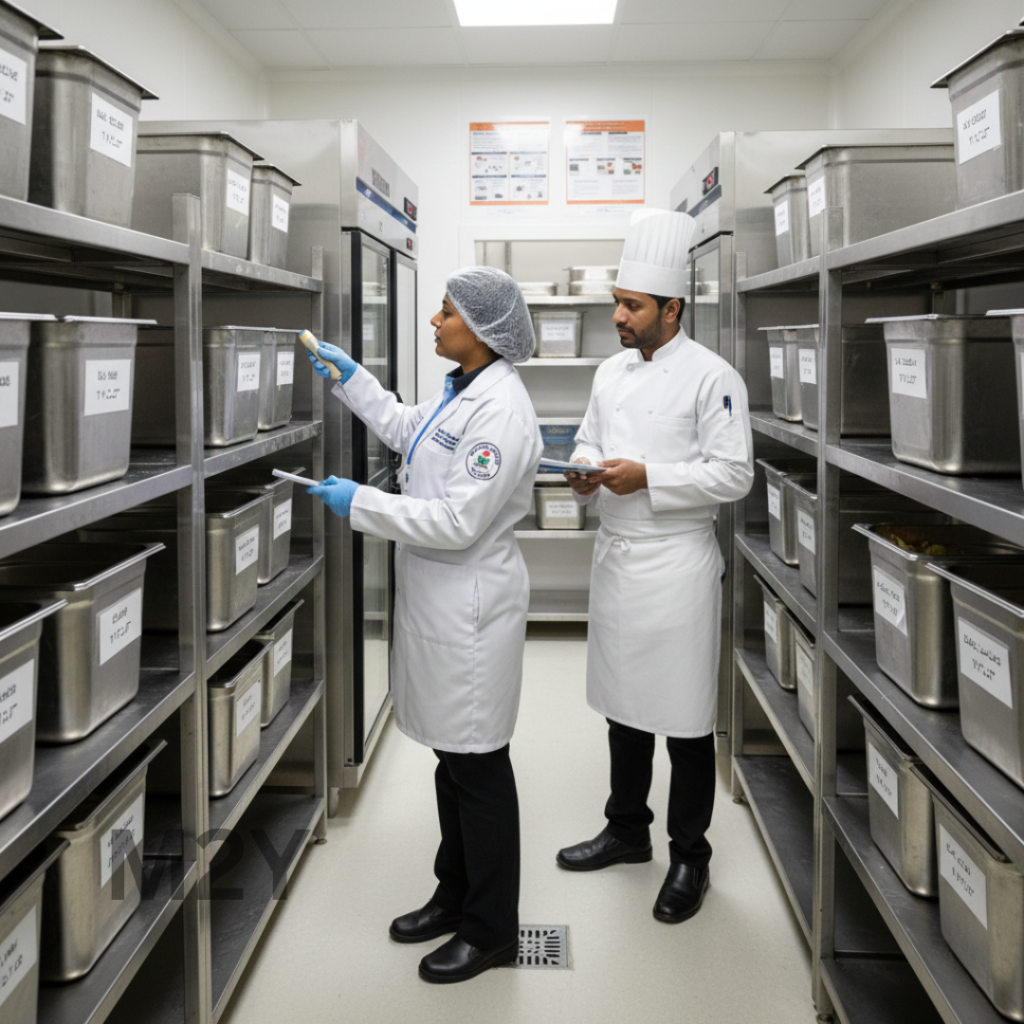
Food Safety Jobs in UAE: Career Opportunities
Food safety training opens diverse career paths across UAE’s massive hospitality and food production sectors.
Entry-Level Positions
Food Handler / Kitchen Assistant:
- Monthly salary: AED 1,500 – AED 3,000
- Requirements: Basic food safety certificate
- Roles: Food preparation, cooking assistance, cleaning
Line Cook / Chef de Partie:
- Monthly salary: AED 2,500 – AED 5,000
- Requirements: Food handler certificate, culinary training
- Roles: Station management, food preparation, plating
Server / Food Service Worker:
- Monthly salary: AED 2,000 – AED 4,000
- Requirements: Food safety awareness, customer service skills
- Roles: Serving food, customer interaction, table service
Mid-Level Positions
Sous Chef / Kitchen Supervisor:
- Monthly salary: AED 5,000 – AED 9,000
- Requirements: Food safety certificate, HACCP training, culinary experience
- Roles: Kitchen operations, staff supervision, menu development
Food Safety Officer:
- Monthly salary: AED 6,000 – AED 10,000
- Requirements: HACCP certification, food science background preferred
- Roles: Safety program implementation, inspections, training staff
Quality Assurance Specialist:
- Monthly salary: AED 7,000 – AED 12,000
- Requirements: FSMS training, auditing experience
- Roles: Quality control, supplier audits, compliance monitoring
Senior Positions
Executive Chef:
- Monthly salary: AED 12,000 – AED 25,000+
- Requirements: Advanced culinary credentials, food safety management
- Roles: Overall kitchen management, menu creation, staff leadership
Food Safety Manager:
- Monthly salary: AED 10,000 – AED 18,000
- Requirements: ISO 22000 training, regulatory expertise
- Roles: Company-wide food safety program management, compliance
Quality Assurance Manager:
- Monthly salary: AED 12,000 – AED 20,000
- Requirements: FSMS certification, management experience
- Roles: Quality systems oversight, audit management, continuous improvement
Food Safety Consultant:
- Monthly salary / Project fees: AED 15,000 – AED 30,000+
- Requirements: Extensive food safety expertise, certifications
- Roles: Advisory services, system implementation, training delivery
Industry Sectors Hiring
Hospitality:
- Hotels and resorts
- Restaurants (fine dining, casual, quick service)
- Cafés and bakeries
- Bars and nightclubs
- Catering companies
Food Production:
- Central kitchens and commissaries
- Food manufacturing facilities
- Bakery production
- Beverage production
- Dairy processing
Retail:
- Supermarket delis and bakeries
- Food courts
- Convenience stores with food service
- Specialty food retailers
Institutional:
- Hospital food service
- School cafeterias
- University dining halls
- Corporate cafeterias
- Government facilities
Airlines and Transportation:
- In-flight catering
- Airport food service
- Cruise ship kitchens
How to Get Food Safety Certified in UAE
Step 1: Determine Your Certification Needs
Ask yourself:
- What’s your current or desired food handling role?
- What does your employer require?
- Are you seeking employment or career advancement?
- Do you need basic handling or advanced management certification?
Entry-level roles: Basic food handler certificate sufficient
Supervisory roles: HACCP training recommended
Management positions: FSMS or ISO 22000 certification preferred
Step 2: Choose an Approved Training Provider
Dubai Municipality maintains a list of approved training providers. Verify your chosen provider is on this list to ensure certification validity.
Look for:
- Dubai Municipality / ADAFSA approval
- Experienced food safety instructors
- Practical training components
- Multiple language options
- Convenient locations and schedules
- Reasonable pricing
- Post-training support
M2Y Safety Consultancy offers:
- Fully approved food safety training programs
- Multilingual instruction (English, Arabic, Hindi, Urdu)
- Weekend and evening classes for working professionals
- On-site corporate training for businesses
- Combined certification packages (food safety + first aid)
- Digital certificates with QR code verification
- Lifetime access to updated food safety materials
Step 3: Attend the Training Course
Basic food handler course typically includes:
Morning Session (3-4 hours):
- Food safety fundamentals
- Personal hygiene standards
- Temperature control principles
- Cross-contamination prevention
- Allergen awareness
- UAE regulatory requirements
Afternoon Session (3-4 hours):
- Cleaning and sanitizing procedures
- Storage and receiving protocols
- Practical demonstrations
- Handwashing technique practice
- Thermometer use training
- Case study discussions
Step 4: Pass the Certification Examination
Written test format:
- 30-50 multiple choice questions
- Covers all course content areas
- Typically 60-90 minutes duration
- Passing score: 70-80% (varies by provider)
- Available in multiple languages
- Immediate results usually provided
Practical assessment (some providers):
- Proper handwashing demonstration
- Temperature taking technique
- Identifying hazards in scenarios
- Safe food handling procedures
If you don’t pass: Most providers allow retesting, sometimes with small additional fee.
Step 5: Obtain Your Medical Fitness Certificate
UAE requires food handlers to have valid medical fitness certificates:
Process:
- Visit approved medical center with your passport/Emirates ID
- Medical examination includes:
- Chest X-ray (tuberculosis screening)
- Blood tests (infectious diseases)
- Physical examination
- Cost: AED 300-500
- Results: 2-5 working days
- Validity: 1 year (must renew annually)
Required for: Food handler permit application
Step 6: Apply for Food Handler Permit
Dubai Municipality Food Handler Permit:
Online application via Dubai Municipality portal:
- Create account or login
- Upload food safety certificate
- Upload medical fitness certificate
- Upload passport/Emirates ID copy
- Pay fee: AED 100-200
- Processing: 3-5 working days
Physical permit card:
- Collect from Dubai Municipality customer service
- Or receive via courier
- Validity: 2-3 years (linked to certificate validity)
Keep your permit card with you while working—inspectors may request to see it.
Step 7: Maintain Your Certification
Annual requirements:
- Renew medical fitness certificate (AED 300-500)
Every 2-3 years:
- Complete refresher food safety training
- Renew certification
- Update food handler permit
Ongoing professional development:
- Attend workshops and seminars
- Stay informed about regulation changes
- Practice safe food handling daily
Why Choose M2Y Safety Consultancy for Food Safety Training
M2Y Safety Consultancy has trained thousands of food handlers across Dubai and UAE, supporting restaurants, hotels, catering companies, hospitals, schools, and industrial kitchens in achieving compliance and excellence.
What Makes M2Y Different
Fully Approved and Recognized: Our food safety training is approved by Dubai Municipality and recognized across all UAE emirates, ensuring your certification is valid for employment anywhere in the country.
Multilingual Training Excellence: We deliver courses in English, Arabic, Hindi, and Urdu with native-speaking instructors, ensuring every participant fully understands critical food safety concepts regardless of language background.
Practical, Engaging Training: We go beyond PowerPoint presentations. Our courses include hands-on practice, real kitchen scenarios, interactive discussions, and memorable demonstrations that make food safety principles stick.
Flexible Scheduling: Weekend courses, evening classes, and on-site corporate training accommodate working professionals and businesses needing to certify staff without disrupting operations.
Affordable Quality: Professional food safety training at AED 150-200 makes certification accessible while maintaining the highest instructional standards.
Corporate Training Packages: We offer significant discounts for restaurants, hotels, and catering companies training multiple employees simultaneously. On-site training at your facility uses your equipment and kitchen layout.
Digital Certificates: Receive verifiable digital certificates with QR codes that employers and inspectors can instantly authenticate, plus physical certificates for your records.
Comprehensive Support: Questions after training? Need clarification on regulations? Our team provides ongoing consultation support to all graduates.
Combined Certification Options: Package food safety with first aid training, fire safety, or other certifications for comprehensive staff development at reduced rates.
Frequently Asked Questions About Food Safety Training
Yes, absolutely. UAE federal law and Dubai Municipality regulations require all persons handling food (including preparation, cooking, serving, and delivery) to complete certified food safety training and obtain a valid food handler permit. This includes chefs, cooks, kitchen assistants, servers, baristas, deli workers, and catering staff. The only exceptions are packaged goods retailers not handling open food. Non-compliance results in fines (AED 5,000-20,000) and potential business closure.
The complete certification process costs approximately AED 550-900 including: food safety training course (AED 150-200), medical fitness certificate (AED 300-500), and food handler permit application (AED 100-200). Some training providers offer package deals combining training and permit processing. M2Y Safety Consultancy offers affordable training at AED 150-200 with assistance navigating the permit application process. Corporate group training receives significant discounts.
Food safety certificates are typically valid for 2-3 years depending on the issuing authority and training level. However, medical fitness certificates must be renewed annually. Your food handler permit validity aligns with your training certificate (2-3 years) but requires maintaining a current medical certificate throughout this period. Plan to renew medical certificates yearly and complete refresher food safety training every 2-3 years to maintain continuous certification.
Usually not directly. While some countries have reciprocal agreements, most foreign food safety certificates require validation or supplementary training covering UAE-specific regulations. The safest approach is completing UAE-approved food safety training (typically 1 day, affordable) to ensure full compliance with local requirements. M2Y Safety Consultancy offers expedited courses for experienced food workers from other countries needing UAE certification quickly.
Comprehensive basic food safety training covers: personal hygiene (handwashing, cleanliness, when to stay home), biological/chemical/physical hazards, temperature control (cooking, cooling, storage), cross-contamination prevention, cleaning and sanitizing procedures, safe food storage and FIFO rotation, receiving and inspecting deliveries, allergen awareness, UAE food safety regulations, and legal responsibilities. The course typically lasts 6-8 hours including practical demonstrations and concludes with a written examination (70-80% passing score required).
Absolutely. Food safety training opens pathways to supervisory and management roles with significantly higher salaries. Entry-level food handlers earn AED 2,000-4,000 monthly, while food safety officers earn AED 6,000-10,000, quality assurance managers earn AED 12,000-20,000, and food safety consultants can earn AED 15,000-30,000+ monthly. Advanced certifications (HACCP, ISO 22000) combined with experience lead to specialized careers in quality management, auditing, regulatory compliance, and consulting across hospitality, food production, and institutional sectors.
Protect Your Career and Customers: Get Food Safety Certified Today
In UAE’s competitive hospitality and food service industry, food safety certification isn’t optional—it’s your entry ticket and your protection.
Food safety training provides:
✅ Legal compliance avoiding fines and business closure
✅ Employment qualification for thousands of food service jobs
✅ Career advancement into supervisory and management roles
✅ Customer protection preventing illness and building trust
✅ Business reputation safeguarding your establishment’s good name
✅ Personal confidence knowing you’re handling food safely
Every meal served, every dish prepared, every customer interaction depends on proper food safety knowledge.
Your Next Steps
- Visit M2Y Safety Consultancy to view food safety training schedules
- Choose your course (basic handler, HACCP, or specialized training)
- Book your training (individual enrollment or corporate group)
- Attend the course with practical, hands-on learning
- Pass your examination and receive your certificate
- Complete medical fitness and permit application
- Start or advance your food service career with confidence
Don’t wait—food safety certification is required before you can legally work in UAE food service.

